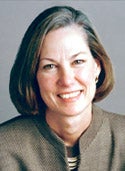On Saudi Arabia

Karen Elliott House, alumna of the College of Communication, Pulitzer Prize-winning journalist and former Wall Street Journal reporter and publisher, recently released a new book titled, "On Saudi Arabia: Its People, Past, Religion, Fault Lines — and Future."
The 336-page hardcover edition was released Sept. 18 and is available in both retail stores and online. House, a graduate of the School of Journalism at The University of Texas at Austin, said she was inspired to investigate the Middle Eastern country after reporting on its foreign policy for more than 30 years.

House began reporting on Saudi Arabia in May 1978 as a diplomatic correspondent for The Wall Street Journal and in the following decades covered issues spanning U.S.-Saudi relations, Arab-Israeli conflicts, the Iran-Iraq war and more. The people-focused reporting for the book began in February 2007 and was recorded over five years with House making more than a dozen extended visits."I wanted, once I retired from the Journal in 2006 and had free time, to understand what made this society tick," said House. "How did the people view their lives, their religion, their rulers, their world?"
"I encouraged people to pass me along to their friends as one needs to be ‘introduced’ to Saudis or they do not talk to strangers," said House. "I took all the Saudis I knew over three decades of reporting — and through them — created a network of hundreds of Saudis all across the country."
House visited with people in rural areas but spent most of her time in the large cities of Riyadh, Jeddah and Dammam, where approximately 85 percent of Saudis live. Individuals she interviewed include women and men, young and old, rich and poor, traditional and reformist.
The profiles paint a portrait of Saudi Arabia that reaches beyond the often-caricatured images of a wealthy nation with seemingly endless oil reserves. In fact, according to House, the resident population of Saudi Arabia consists of 19 million people some 40 percent of whom live on less than $1,000 a month.
"Life is sustainable on this low level of income only through reliance on extended family, charity, often poor-quality government-provided education and health care, and government-subsidized energy," said House. "Some 60 percent of Saudis cannot afford a home because land prices are so astronomical."
While the nation is extremely conservative, House said the society is also in transition, as tensions grow between traditional conservatives and modern Saudis who prefer more liberal versions of Islam practiced in neighboring Gulf States.
"More Saudis are favoring independence in how they practice their religion," said House. "This includes more women who want to work and a growing number who want to drive. A minority of Saudis live Western lives in the privacy of their homes – watching forbidden movies, consuming alcohol and drugs, mixing men and women at decidedly private dinner parties, wearing shorts, tight jeans and other non-Islamic clothing."
House even spent time with government-reformed terrorists who were provided homes and jobs in exchange for repenting their ways. Most participants of the program she interviewed were arrested before actually executing a plot.
Interestingly, the majority of those she spoke with said they were essentially bored and turned to jihad not out of religious fervor, but to find purpose and in some cases excitement. House points out that there are no cinemas or clubs for young men to congregate and that 40 percent of men age 20-24 are unemployed.
"These bored young men look for something to give purpose and excitement to their lives. Some steal cars for the thrill -- I interviewed a number of those," said House. "Some use drugs. Some try jihad. Some languish in their boredom at home watching – in one case I interviewed – Egyptian soap operas and playing video games."
As for the reformation process, the government-funded program exists to prevent a cycle of alienated Saudis whose relatives would also be ostracized by society, fostering further malcontent. Participants are encouraged to read books, express themselves through art, exercise in well-equipped gyms and play soccer.
"The government is rehabilitating terrorists by providing them everything they do not provide the rest of the population," said House. "Once they are deemed 'rehabilitated,' they are given a car and money to procure a wife and help finding a job. Again, all the things the wider Saudi population doesn't enjoy from government."
Essentially, one is considered reformed when the experts – religious leaders, psychologists and psychiatrists – deem the individual has abandoned thoughts of violence.
Other topics in the book include women’s rights, the justice system, the government's relation to its citizens and the complex everyday life of the nation, which House said fosters obedience and curbs individual initiative.
"I do observe that this dependency suits the Al Saud rulers whose focus is retaining power, though it does not serve economic prosperity," said House. "As a result of this religious indoctrination, too many Saudis lack enterprise and initiative."
What intrigues House about Saudi Arabia is how different it is from the U.S., citing that Americans prize independence over community, separate church from state and provide women with equal rights. In Saudi Arabia, House said religion is the primary subject for all students in school and that women are completely dependent on men, even to the point of having a required male guardian.
"We are very mobile society and marry outside our religions, our states, our nation," said House. "Saudis marry, if at all possible, their first cousin – so hardly ever outside their family, let alone tribe or religion. We are taught to express ourselves even as children; they are taught to keep thoughts private. We are taught curiosity is a great trait; they are taught never to question."
"The most important thing I learned was simply a much better understanding of a shrouded, little-understood society and an enormous amount of new information on the religion of Islam," said House.
